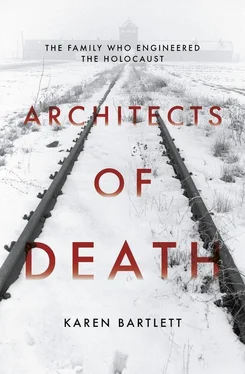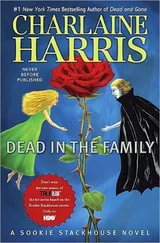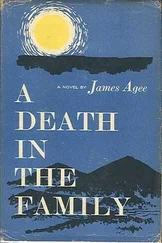Ludwig immediately agrees to release Meier, but puts the reason down to his brother being dissatisfied with Meier’s work. According to the file notes, Ludwig ‘recognised that there was no longer any basis for successful collaboration with him – and not because of Meier’s blackmail. (The arguments Meier made were of a downright blackmailing character!)’. However, when Ludwig speaks to his brother, Ernst Wolfgang says he wants to speak with Meier personally. Ernst Wolfgang and Fritz Meier then sit down for a meeting in the presence of a secretary – and argue back and forth at great length.
Ernst Wolfgang wants to carry out an investigation (one of the many that seem to be constantly underway at Topf and Sons) saying:
‘You want me to believe I have insulted your honour! Without giving me any opportunity to defend myself.’
It was ‘Serious abuse!’ Meier insists. ‘What kind of abuse?’, Ernst Wolfgang demands to know. The memo notes: ‘Meier replied that he couldn’t say the word because there was a lady present… Herr E. T. found it hard to understand this misplaced sensitivity. He didn’t comment further, however, but began to guess what the word might have been. He hit upon the word, “arsehole”, at random.’
Following this exchange, the two continue to spar over whether Meier will document his allegations and name those who had made him aware of the insult. This seems to send Meier in to a panic: ‘Meier then gave every appearance of wanting to leave the room immediately, as if he wanted to run out of the building… Herr E. T. replied emphatically: “You are my employee; I do not give you permission to leave the building!”’ By mid-afternoon, and after involving many other members of staff in the dispute, the Topf brothers agree to let Meier leave the premises.
With Fritz Meier’s eventual, exhausted departure, both brothers have spent an entire working day embroiled in an argument about whether Ernst Wolfgang called a staff member an ‘arsehole’ – or, more to the point, whether he could prove it. Rather than address Meier’s complaints, the brothers let their emotions run riot as they determine to discover who made such claims. And it seems Fritz Meier is not alone in his unhappiness – a few days later an anonymous letter about the company lands on the desk of the Weimar Military Command.
On 5 March, Ernst Wolfgang opens a file on the anonymous letter (which it transpires is the second such epistle), beginning with an account of a preliminary meeting between operations director Gustav Braun, representing Topf and Sons, and the Erfurt Chamber of Industry and Trade, who have been asked to investigate the matter and report back to Military Command.
The contents of the letter were approximately as follows:
1. J. A. Topf and Sons, Erfurt, is a complete shambles of a business. Everything’s all over the place and no one has a handle on what’s going on.
2. An acting director from Berlin therefore needs to be installed and the senior directors of the company need to be removed from their posts. A commission to investigate this scandalous state of affairs has already been formed. The writer merely wished to secure the agreement of the Military Command: this was supposedly required in order for the action to be implemented by Berlin…
3. The same conditions can be found in both the office premises and operations. Waste of materials, faulty work, discrepancies etc. – these all occur constantly.
4. Company director E. T. doesn’t arrive until 11 a.m., and hardly bothers with the business at all. Pursues his own private interests. The same applies to company director L. T.
5. The financial situation is in complete disarray. The company is still living on down payments. When these run out, it will go bankrupt, causing monstrous harm to the state.
6. Production planning is just a completely disorganised, disordered group of people. To all intents and purposes it doesn’t actually exist at all, it just swallows up a lot of money. And it’s the same with the other departments too.
7. The firm continually does things that are not permitted; its manufacturing isn’t actually war manufacturing.
8. The firm should be attached to the Gustloff Foundation. [60] Memo about anonymous letter regarding Topf and Sons, Landesarchiv Thüringen - Hauptstaatsarchiv Weimar.
The Erfurt Chamber of Commerce asks Gustav Braun to address each of these points in detail, as well as provide examples. He does so and then reports back to Ernst Wolfgang, who seems most concerned by the allegation that he only arrives at the office at 11 a.m.:
On the subject of my late arrival… It had been unreservedly confirmed by the Chamber of Industry and Trade that a company director is not required to keep the same office hours as his workers, but must be free to shape his office hours and other activities as he judges best… They fully understood that my physical and nervous constitution meant that I chose to work different hours – with more emphasis on the afternoon and evening – and did not start at 8 a.m.
Regarding the claims of ‘financial disarray’ the Erfurt Chamber of Commerce reveals that it is already aware of Topf and Sons’ reliance on bank loans. Braun then discusses the claims concerning the planning and construction department – and specifically mentions the dismissal of Fritz Meier and the allegation that Ernst Wolfgang had called him an ‘arsehole’. The conversation again then turns back to the leadership of Ernst Wolfgang:
‘Overall, then, Herr Braun responded to each individual accusation with examples and arguments showing how we work. He even dismissed the accusation that E. T. was never to be found in the company.’
Braun’s role as operations director
made it possible for E. T. to be released from operational tasks of that kind. This was a fundamental working and business principle of the company, because E. T. was currently responsible for the entirety of the company administration and planning, and it would lead to fragmentation if he popped up everywhere. This, too, the gentlemen found understandable.
The meeting concludes with Gustav Braun informing the Chamber of Industry and Trade about the existence of another anonymous letter, which they then ask Braun to forward to them so that they can try and identify the sender ‘and punish him in a way that will make an example of him’. Included in brackets are Ernst Wolfgang Topf’s musings ‘(I just wonder how they propose to do that; for no one knows who sent the letter, and it won’t be easy to find out.)’
The difficulty of the task notwithstanding, Ernst Wolfgang begins an exhaustive process to do just that – he starts by accusing Eduard Pudenz of being the author. An alarmed Pudenz swears that he is innocent and does not agree with the letter’s contents.
As the name of the letter writer appears to contain a ‘Z’, Ernst Wolfgang moves on to an interview with Herr Belz in the production planning department, and tried to get him to submit a list of names of those dissatisfied with the production planning process.
In an emotional outburst, Ernst Wolfgang explains:
Our work for the company is our life’s work. We care for it as much as we care for ourselves and we are always available for it; and if it’s in trouble, we are always the first on the scene. On the other hand, in normal circumstances, our working time is intended to be devoted to company management issues, so as to prevent our strength and energy being exhausted on everyday matters. We need time for planning and for reflecting on the effects of our work: we mustn’t allow ourselves to be pushed and pulled about by events.
This seems ironic given that the Topf brothers are constantly distracted by every piece of passing gossip, but Ernst Wolfgang goes on:
Читать дальше












